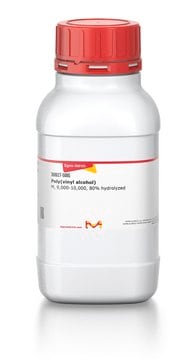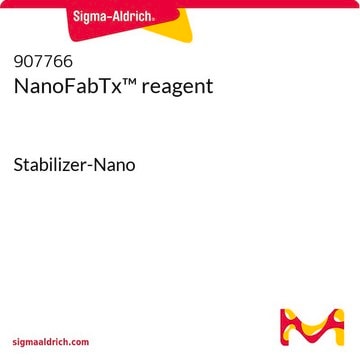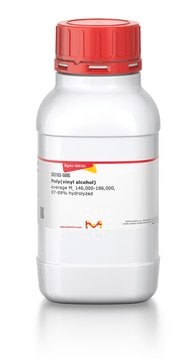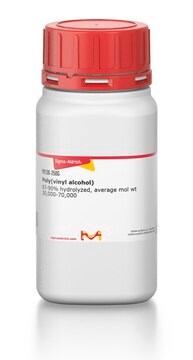81383
Alcool polyvinylique
Mw ~67,000
Synonyme(s) :
Poly(vinyl alcohol)
About This Item
Produits recommandés
Forme
crystals
Niveau de qualité
Poids mol.
Mw ~67,000
Ampleur du marquage
86.7-88.7 mol% hydrolysis
~1,400 polymerization
Impuretés
10.0-11.6% residual content of acetyl
Résidus de calcination
≤0.5%
Viscosité
7-9 mPa.s, 4 % in H2O(20 °C)
Indice d'ester
130‑150
InChI
1S/C2H4O/c1-2-3/h2-3H,1H2
Clé InChI
IMROMDMJAWUWLK-UHFFFAOYSA-N
Vous recherchez des produits similaires ? Visite Guide de comparaison des produits
Application
- Polyvinyl alcohol coating releasing fungal blastospores improves kill effect of attract-and-kill beads: This study evaluates the use of different types of polyvinyl alcohol (PVA), including Mowiol® 8-88, for developing fungal blastospore coatings that enhance pest control efficacy (KM Hermann et al., 2023, Springer).
- Biodegradable nanoparticles made of amino-acid-based ester polymers: Discusses the use of Mowiol 8-88 in the preparation of biodegradable nanoparticles, analyzing their stability and aggregation properties (T Kantaria et al., 2016, MDPI).
Informations légales
Code de la classe de stockage
11 - Combustible Solids
Classe de danger pour l'eau (WGK)
WGK 1
Point d'éclair (°F)
No data available
Point d'éclair (°C)
No data available
Équipement de protection individuelle
Eyeshields, Gloves, type N95 (US)
Certificats d'analyse (COA)
Recherchez un Certificats d'analyse (COA) en saisissant le numéro de lot du produit. Les numéros de lot figurent sur l'étiquette du produit après les mots "Lot" ou "Batch".
Déjà en possession de ce produit ?
Retrouvez la documentation relative aux produits que vous avez récemment achetés dans la Bibliothèque de documents.
Les clients ont également consulté
Notre équipe de scientifiques dispose d'une expérience dans tous les secteurs de la recherche, notamment en sciences de la vie, science des matériaux, synthèse chimique, chromatographie, analyse et dans de nombreux autres domaines..
Contacter notre Service technique



![1,4-Diazabicyclo[2.2.2]octane ReagentPlus®, ≥99%](/deepweb/assets/sigmaaldrich/product/structures/366/129/a6ff4175-974d-4fac-9038-b35e508ef252/640/a6ff4175-974d-4fac-9038-b35e508ef252.png)



